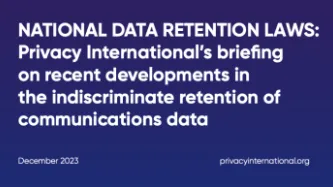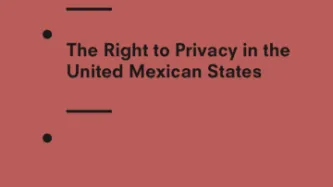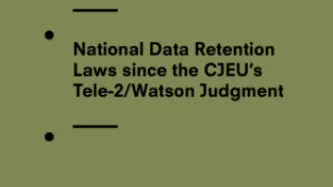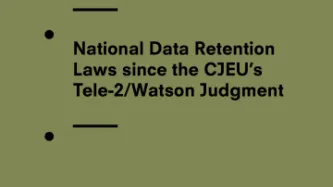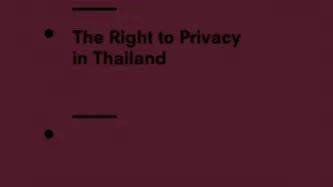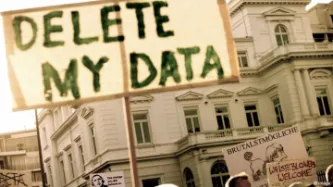Search
Content type: Long Read
… as we warn now: industry has to answer for itself which state security services it would be prepared to work for. … Terms of Service by storing surveillance data. Microsoft states that their Terms of Service “prohibit the use of our … its relationship with Israel over its commitments to privacy and human rights. What we also know: it’s an …
Content type: Report
… PI’s briefing examing the current state of affairs in bulk data retention regulation across … new report is an attempt to shed some light on the current state of affairs in data retention regulation across ten key jurisdictions. Privacy International has consulted with human rights …
Content type: Long Read
… result En réponse à une action en justice initiée par Privacy International au Royaume-Uni, la Cour de justice de … for national security purposes undertaken by member states, must comply with EU law, and therefore must be … applies, even in the national security context, if a member state’s surveillance law requires a telecommunications …
Content type: Long Read
Q&A: EU's top court rules that UK, French and Belgian mass surveillance regimes must respect privacy
… questions. Achieved result Following a lawsuit initiated by Privacy International the Court of Justice of the European … for national security purposes undertaken by member states, must comply with EU law, and therefore have to be … for national security purposes undertaken by member states, must comply with EU law, and therefore must be …
Content type: Press release
… done for the purposes of national security. EU law sets out privacy safeguards regarding the collection and retention of … or retention regimes engage European fundamental rights to privacy, data protection, freedom of expression, as … apply European human rights law standards to the French State.” Lori Roussey, chair of Data Rights, said: “Now the …
Content type: Press release
… calls for reforms and safeguards so that people's data and privacy is protected from unnecessarily intrusive practices. … and failures by the police in terms of data protection and privacy rights. The report comes as a result of PI’s … that was initiated, in part, because of that complaint. As stated in the report, page 12: "This investigation took into …
Content type: Long Read
… others by Law, we have been giving away small bits of our privacy without asking why or for what. And we are becoming … observed than ever before. And we risk getting used to a state of continuously giving away our privacy. Despite all … secure from our personal habits and preferences being in a state database, and free to think, do and say what we really …
Content type: Advocacy
… Advocacy Post date 19th August 2019 RESPONSE OF PRIVACY INTERNATIONAL TO THE CONSULTATION ON THE … telestyrelsen ( Case-203/15) and R (Watson) v Secretary of State for the Home Department (Case C-698/15) [“Watson … concerning the power of the power of the Secretary of State to require communications service providers to retain …
Content type: Long Read
… Edward Snowden leaked documents providing details about how states' mass surveillance programmes function, two states – the UK and South Africa – publicly admit using bulk … came during and as a result of legal proceedings brought by Privacy International and other civil society actors …
Content type: Long Read
… technologies prioritises corporate profits over peoples’ privacy There are solutions that can be used to address … organise, and protest without unlawful interference by the state authorities. Most of these surveillance technologies … of wrongdoing. This has happened in the past. In the United States, the now defunct National Security Entry-Exit …
Content type: Advocacy
… by Red en Defensa de los Derechos Digitales (R3D) and Privacy International (PI). La Red en Defensa de los … to the defence of human rights in the digital environment. Privacy International (PI) is a non-governmental, non-profit … Attachments UPR_The Right to Privacy in the United Mexican States.pdf Learn more Comms Data Retention Communications …
Content type: Press release
… Press release Post date 25th June 2018 Privacy International, Liberty, and Open Rights Group have … of personal data unlawful, the majority of EU Member States have yet to stop the form of surveillance. While member states continue to discuss behind closed doors how to …
Content type: Impact Case Study
… of data by private companies becomes increasingly privacy intrusive and widespread, data retention and … communications data. By the early 2000s, some EU member states had enacted national data retention laws, and were … European population.” Despite the decision, some EU member states continued to mandate data retention at the national …
Content type: Press release
… Press release Post date 7th February 2018 The Case Privacy International v Secretary of State for Foreign and Commonwealth Affairs et al. (Bulk … of data; and c) proportionality. (a) It is Privacy International’s position that the collection of bulk …
Content type: Long Read
… Long Read Post date 29th January 2018 Privacy International is celebrating Data Privacy Week , … is particularly important when it comes to control of how States perform these activities. In fact, the first data … certain public goods, but these needs are also commonly overstated, and lead to diverse number of abuses and human …
Content type: Report
… 23rd October 2017 This report sheds light on the current state of affairs in data retention regulation across the EU post the Tele-2/Watson judgment. Privacy International has consulted with digital rights NGOs … survey of data retention regimes in the EU to date, Privacy International would be grateful to receive any …
Content type: Press release
… Press release Post date 6th September 2017 Key points Privacy International surveyed 21 EU member states' legislation on data retention and examined their … with fundamental human rights standards 0 out of the 21 States examined by PI are currently in compliance with these …
Content type: Advocacy
… 1st September 2017 This report sheds light on the current state of affairs in data retention regulation across the EU post the Tele-2/Watson judgment. Privacy International has consulted with digital rights NGOs … survey of data retention regimes in the EU to date, Privacy International would be grateful to receive any …
Content type: Advocacy
… Advocacy Post date 3rd April 2017 Privacy International's submission on the right to privacy in Thailand, Human Rights Committee, 119th Session. … inadequate, unclear as to the powers, scope and capacity of state surveillance activities and thus it falls short of the …
Content type: News & Analysis
… “It is what you might call ‘acceptable deaths,’” he states about the misuse of communications surveillance … NIS is the sacred cow of Kenya’s increasingly securitised state. It is the main agency conducting signals intelligence … real abuses in the effort to minimise those threats. Today, Privacy International publishes a new investigation – ' …
Content type: Long Read
… Long Read Post date 26th July 2016 Privacy International’s case on Bulk Personal Datasets and … infrastructure. [Intelligence & Security Report 2013] As stated by the Intelligence Agencies: “Bulk Communications … obtaining communications data in bulk using section 94. As stated earlier, whilst section 94 was used by the Security …
Content type: News & Analysis
… . It does not necessarily reflect the views or position of Privacy International. On 23rd March the United Nations … access to the communications surveillance capacities of the state to spy on their perceived opponents. The full extent … that the most powerful mass surveillance machine of the state is the one that is least regulated: an issue that …
Content type: News & Analysis
… world leading legislation that would balance security and privacy, what the Government is actually seeking is a … of interest’s behaviour and connections”. In June 2015, Privacy International filed a legal complaint against the UK … an effective way to monitor crime. In June 2015, the United States congress passed the USA Freedom Act curtailing the …
Content type: Press release
… according to secret government documents obtained by Privacy International. A feature broadcast piece will air … International's new report, For God and My President: State Surveillance in Uganda, exposes the secret … facilitate infection of targets' devices. The CMI solicited state funds to 'bribe' collaborators to facilitate …
Content type: News & Analysis
… tactic to wear us down. We get tipped off by people in the state. They tell us ‘people are listening to you.’... Father Alberto is one of the many Colombians with whom Privacy International spoke for our investigation released today, Shadow State: Surveillance Law and Order in Colombia. Our …
Content type: News & Analysis
… News & Analysis Post date 4th November 2014 As privacy and free expression advocates hail the demise of the … to invalidate the Directive. The power of the Secretary of State to pass the 2009 Regulations is conditional upon the … retroactively invalidated the Directive, the Secretary of State is retroactively deprived of the power to make the …
Content type: Press release
… Directive policy, was strong and unequivocal: the right to privacy provides a fundamental barrier between the … on this scale are completely unacceptable. As the Court states, it is not, and never was, proportionate to spy on … down. What the Court said today is similar to arguments privacy advocates have said for some time. The mass …
Content type: Press release
… Press release Post date 4th November 2013 Privacy International today has filed formal complaints with … (GCHQ) surveillance program, Tempora. As a result, Privacy International believes that there are grounds to … rights of their customers." Location United Kingdom United States of America Our fight Contesting Government Data and …
Content type: Press release
… users as to what intermediaries are doing to protect their privacy when it comes to sharing data with governments. … and too great a trust to be placed in them. Location United States of America Our fight Contesting Government Data and …
Content type: News & Analysis
… written by Shawna Finnegan and Carly Nyst, for APCNews and Privacy International: At the 23rd session of the UN Human … his latest report – an analysis of the implications of States’ surveillance of communications on the exercise of … more Mass Surveillance Comms Data Retention Location United States of America …

